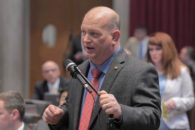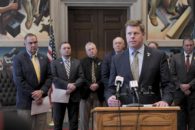Despite taking effective steps early in the pandemic, the Missouri Veteran’s Commission (MVC) was “lulled into a false sense of security” before coronavirus cases surged in veterans’ homes this fall, according to a new report.
“MVC Headquarters failed to recognize and appreciate the impact of even one positive case of COVID-19,” the report, COVID-19 Outbreak at Missouri Veterans’ Homes, said. “This meant that MVC leadership did not change tactics to aggressively contain the first positive cases, nor did they reach out to external partners for assistance. Instead, they treated the initial cases as something that could be overcome using the same directives, policies, and internal resources that had been employed prior to the positive case.”
Gov. Mike Parson ordered MVC Chairman Tim Noonan to conduct a review of the agency’s seven homes after severe outbreaks began in Cape Girardeau and Mount Vernon in September. Armstrong Teasdale, a law firm headquartered in St. Louis, was appointed by the state to handle the study.
The report, released this week, outlined three areas MVC allegedly faltered in: recognizing, planning for, and responding to an outbreak.
The report said MVC took a number of steps to prepare for the pandemic in March including tracking critical information, developing plans for drug and equipment shortages, and adjusting policies for staff and residents. The report praised MVC’s early preparations, noting very few positive cases emerged in its facilities until late summer while other long-term care facilities saw massive outbreaks and losses.
MVC failed to adapt to new guidance or procedures as the pandemic wore on, according to the study. The report also said the agency failed to develop a plan for an extensive outbreak and reported insufficient testing and staffing.
The report included relegating residents to private rooms and limiting the number of visitors in its list of recommendations. Parson said he was limited on what he could say about the report, but noted that steps would have to be taken to keep veterans’ homes safe.
“When the cases started rising, that’s when it became a red flag for us at the Governor’s Office,” Parson told reporters Thursday. “I think there are some things in that report that are going to have to be addressed and going to have to be explained.”
Armstrong Teasdale interviewed more than 170 individuals including personnel and residents, conducted on-site audits of the homes, set up a hotline for veterans and families, and analyzed more than 900 documents in October and November to compile the report.
“Ordering this rapid independent external investigation is only the first step in a series of future endeavors the MVC and other external stakeholders should take in order to ensure the protection of the veterans under their care,” the report said. “It is our hope that these findings and recommendations will serve as a launching point of positive change for those who deserve it the most.”
The report said more than 86,000 positive cases had been confirmed in veterans’ homes across the county since March, 342 of which were in Missouri facilities.

Cameron Gerber studied journalism at Lincoln University. Prior to Lincoln, he earned an associate’s degree from State Fair Community College. Cameron is a native of Eldon, Missouri.
Contact Cameron at cameron@themissouritimes.com.





































